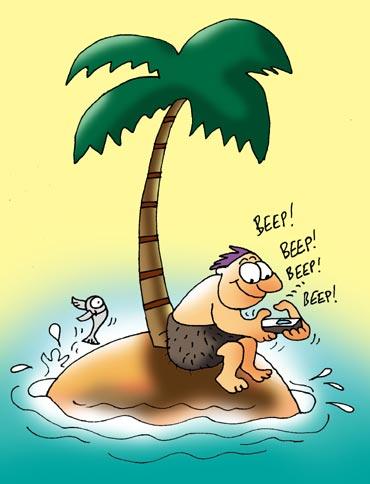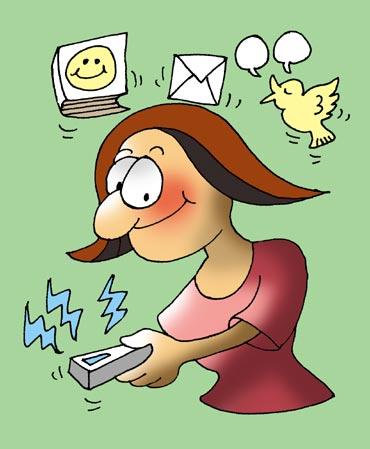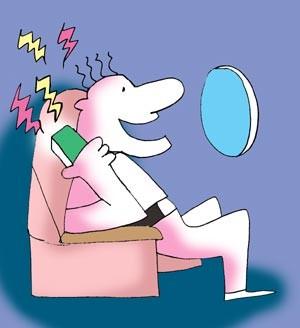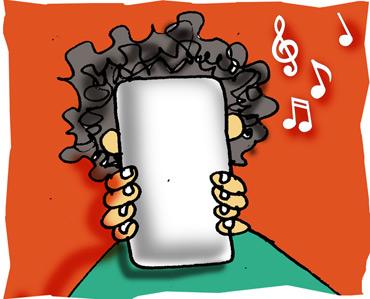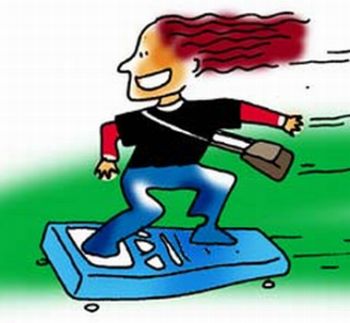This article was first published 14 years ago
10 tips to crack a telephonic interview!
Last updated on: May 30, 2011 18:38 IST
Image: Make sure you are by yourself when you're taking that call
So you have a job interview over the phone. Parul Banka lists out ten things that you must remember before you take that all-important call.
Relived that you would not have to go in person for the next job interview and that you would not have to look impeccably dressed up, when you go there? Well, travelling and dressing up effort might have been saved, but there is still lot of care that should be taken during a telephonic interview. This article explores some tips to effectively deliver interviews over phone:
Find a quiet corner:
Nothing is worse than getting interrupted when you are trying to articulate your thoughts in a discussion. Always give a telephonic interview from a place with no interruptions. If you are at home, please send other members of the family and pets away from the room.
Parul Banka is a Human Resources and Training professional.
Image: Make sure you have a copy of your resume handy
Always have a copy of the CV next to you on an uncluttered desk. You should be able to refer to it as and when required. It would be weird if the interviewer refers to a specific point on your resume, which you aren't able to remember and are also not in a position to find out.
Image: Your nervousness, smile, grimaces can all be caught through your voice
Remember that even if you cannot be seen by the interviewer, your voice would be heard. Each time you smile or grimace would reflect in your voice too. Just watch out for what you speak and what you might be speaking without your own knowledge.
Image: Be prepared for long conversations. Keep your phone on speaker or perhaps on bluetooth
There could be interviews where you are required to solve a case study or do some number crunching. In such cases, it would help to have both the hands free, if you are working out the solution. A hands-free or blue-tooth or a landline phone with speaker would be handy in such a situation.
This also helps in interviews of long durations: If you speak for say an hour, the mobile phone might get warm and hence uncomfortable to hold and your arm may get tired holding it.
Image: Make sure you're in a position to take notes
If an interviewer throws some data at you that would need to work out a solution, a pen and paper would be very useful. Also, as the interview comes to an end, you can note down the 'way forward' information.
Image: Make sure you have a glass of water handy
Simple but usually forgotten; have a glass of water available to wet your parched throat during an interview.
Image: Be careful of the pace at which you speak
If you tend to speak quickly, watch your speed. The interviewer does not have the benefit to see your body language, so it is important to speak clearly and at a speed that you are understood at. This becomes even more critical, if you are speaking to a person from another country. People in different countries speak at different pace; so be careful.
Image: Even though you may not be able to see his/her face make sure you have your interviewer's name right
People usually are not flattered if their names are mispronounced. If a name is new to you, please check with the interviewer for the correct pronunciation right in the beginning. Again, this point becomes imperative, when you interact with someone speaking a different language.
Image: Make sure you're available for the call and aren't galavanting at the appointed time
Ensure that you are available to take the call at the designated time. Call unanswered is just not the acceptable.
Image: Make sure you ask your interviewer about the next step to be taken
At the end of the interview, remember to enquire about the next step and note it down.
I hope that these tips help you in your next interview.
